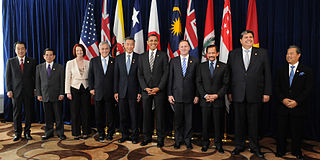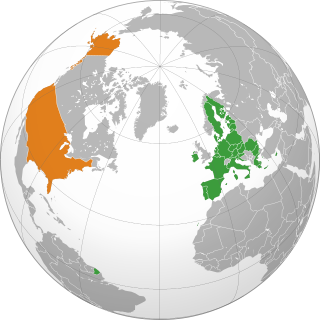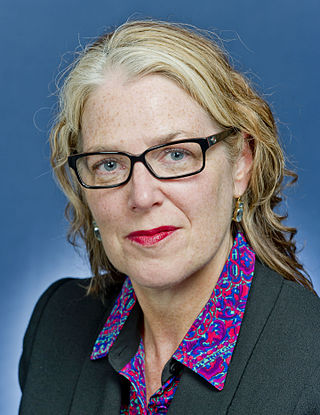
Glyn Moody is a London-based technology writer. He is best known for his book Rebel Code: Linux and the Open Source Revolution (2001). It describes the evolution and significance of the free software and open source movements with interviews of hackers.

Ronald Kirk is an American lawyer and politician who served as the United States Trade Representative from 2009 to 2013, as the 97th secretary of state of Texas, and as the 56th mayor of Dallas from 1995 to 2002. He is a member of the Democratic Party.
A secret treaty is a treaty in which the contracting state parties have agreed to conceal the treaty's existence or substance from other states and the public. Such a commitment to keep the agreement secret may be contained in the instrument itself or in a separate agreement.
A European Union Association Agreement or simply Association Agreement (AA) is a treaty between the European Union, its Member States and a non-EU country or bloc of countries that governs bilateral relations. Areas frequently covered by such agreements include the development of political, trade, social, cultural and security links. The provision for an association agreement was included in the Treaty of Rome, which established the European Economic Community, as a means to enable co-operation of the Community with the United Kingdom, which had retreated from the treaty negotiations at the Messina Conference of 1955. According to the European External Action Service, for an agreement to be classified as an AA, it must meet several criteria:
1. The legal basis for [association agreements'] conclusion is Article 217 TFEU
2. Intention to establish close economic and political cooperation ;
3. Creation of paritary bodies for the management of the cooperation, competent to take decisions that bind the contracting parties;
4. Offering most favoured nation treatment;
5. Providing for a privileged relationship between the EC and its partner;
6. Since 1995 the clause on the respect of human rights and democratic principles is systematically included and constitutes an essential element of the agreement;
7. In a large number of cases, the association agreement replaces a cooperation agreement thereby intensifying the relations between the partners.
Trade in Services refers to the sale and delivery of an intangible product, called a service, between a producer and consumer. Trade in services that takes place between a producer and consumer that are, in legal terms, based in different countries is called International Trade in Services.
The Multilateral Agreement on Investment (MAI) was a draft agreement negotiated in secret between members of the Organisation for Economic Co-operation and Development (OECD) between 1995 and 1998. It sought to establish a new body of universal investment laws that would grant corporations unconditional rights to engage in financial operations around the world, without any regard to national laws and citizens' rights. The draft gave corporations a right to sue governments if national health, labor or environment legislation threatened their interests. When its draft became public in 1997, it drew widespread criticism from civil society groups and developing countries, particularly over the possibility that the agreement would make it difficult to regulate foreign investors. After an intense global campaign was waged against the MAI by the treaty's critics, the host nation France announced in October 1998 that it would not support the agreement, effectively preventing its adoption due to the OECD's consensus procedures.

The Trans-Pacific Partnership (TPP), or Trans-Pacific Partnership Agreement (TPPA), was a proposed trade agreement between 12 Pacific Rim economies: Australia, Brunei, Canada, Chile, Japan, Malaysia, Mexico, New Zealand, Peru, Singapore, Vietnam, and the United States. In the United States, the proposal was signed on 4 February 2016 but not ratified as a result of significant domestic political opposition. After taking office, the newly elected President Donald Trump formally withdrew the United States from TPP in January 2017, therefore ensuring the TPP could not be ratified as required and did not enter into force. The remaining countries negotiated a new trade agreement called Comprehensive and Progressive Agreement for Trans-Pacific Partnership, which incorporated most of the provisions of the TPP and which entered into force on 30 December 2018.

The European Commissioner for Trade is the member of the European Commission responsible for the European Union's common commercial policy.

WikiLeaks is a non-profit media organisation and publisher of leaked documents. It is funded by donations and media partnerships. It has published classified documents and other media provided by anonymous sources. It was founded in 2006 by Julian Assange. Kristinn Hrafnsson is its editor-in-chief. Its website states that it has released more than ten million documents and associated analyses. WikiLeaks' most recent publication of original documents was in 2019 and its most recent publication was in 2021. From November 2022, numerous documents on the organisation's website became inaccessible. In 2023, Assange said that WikiLeaks is no longer able to publish due to his imprisonment and the effect that US government surveillance and WikiLeaks' funding restrictions were having on potential whistleblowers.

The Anti-Counterfeiting Trade Agreement (ACTA) is a multilateral treaty for the purpose of establishing international standards for intellectual property rights enforcement that did not enter into force. The agreement aims to establish an international legal framework for targeting counterfeit goods, generic medicines and copyright infringement on the Internet, and would create a new governing body outside existing forums, such as the World Trade Organization, the World Intellectual Property Organization, and the United Nations.

The Comprehensive Economic and Trade Agreement is a free-trade agreement between Canada and the European Union and its member states. It has been provisionally applied, thus removing 98% of the preexisting tariffs between the two parts.
Investor–state dispute settlement (ISDS), or an investment court system (ICS), is a set of rules through which states can be sued by foreign investors for certain state actions affecting the foreign direct investments (FDI) of that investor. This most often takes the form of international arbitration between the foreign investor and the state. As of June 2024, over US$113 billion has been paid by states to investors under ISDS, the vast majority of the money going to fossil fuel interests.
WikiLeaks began publishing the United States diplomatic cables leak on 28 November 2010. The documents included classified cables that had been sent to the U.S. State Department by its consulates, embassies, and diplomatic missions around the world. The cables were dated between December 1966 and February 2010, and contained assessments of host countries and their officials. The publication of the cables produced varying responses around the world.
WikiLeaks, a whistleblowing website founded by Julian Assange, has received praise as well as criticism from the public, hacktivists, journalist organisations and government officials. The organisation has revealed human rights abuses and was the target of an alleged "cyber war". Allegations have been made that Wikileaks worked with or was exploited by the Russian government and acted in a partisan manner during the 2016 U.S. presidential election.

The Transatlantic Trade and Investment Partnership (TTIP) was a proposed trade agreement between the European Union (EU) and the United States, with the aim of promoting trade and multilateral economic growth. According to Karel de Gucht, European Commissioner for Trade between 2010 and 2014, the TTIP would have been the largest bilateral trade initiative ever negotiated, not only because it would have involved the two largest economic areas in the world but also "because of its potential global reach in setting an example for future partners and agreements".

The Cross-Strait Service Trade Agreement, commonly abbreviated CSSTA and sometimes alternatively translated Cross-Strait Agreement on Trade in Services, is a treaty between the People's Republic of China and the Republic of China (Taiwan) that was signed in June 2013. However, it was never ratified by the Taiwanese legislature due to opposition from the Sunflower Student Movement, which rejected the CSSTA on the grounds that the Kuomintang (KMT) leadership in Taiwan negotiated and attempted ratification of the treaty in an undemocratic way.

Jan Elizabeth Adams is a senior Australian public servant who has served as the Secretary of the Department of Foreign Affairs and Trade since July 2022. Adams is also a former Australian diplomat who served as the Australian Ambassador to Japan since October 2020. She was previously the Australian Ambassador to China from February 2016 to August 2019.
The negotiations for the Trans-Pacific Partnership Agreement were held between 12 countries between 2008 and 2015. The negotiations were aimed at obtaining an agreement between the Trans-Pacific Strategic Economic Partnership Agreement parties Brunei, Chile, Singapore and New Zealand, as well as the Australia and the United States.
Issues in the 2016 United Kingdom European Union membership referendum are the economic, human and political issues that were discussed during the campaign about the withdrawal of the United Kingdom from the European Union, during the period leading up to the Brexit referendum of 23 June 2016. [Issues that have arisen since then are outside the scope of this article].










